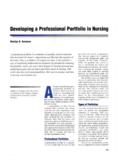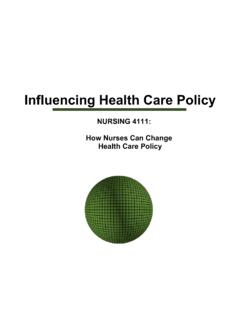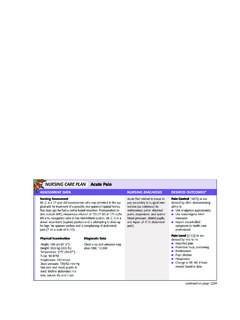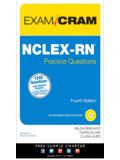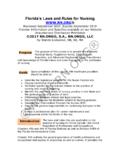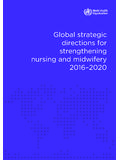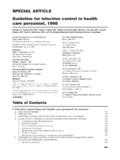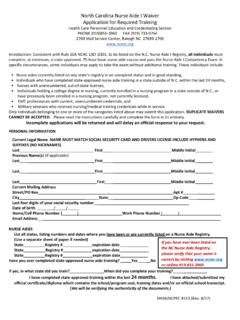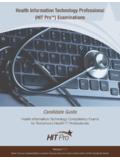Transcription of Nurses computer literacy and attitudes towards …
1 JOURNAL OF nursing INTERVENTIONSN urses computer literacy and attitudes towardsthe use of computers in health careSati G rdas Topkaya MSc BSNUnit Charge- nurse , Orthopaedics and Traumatology Clinic, Taksim Training and Research Hospital, Istanbul, TurkeyNurten Kaya PhD BSNA ssociate Professor, Health Sciences Faculty, Istanbul University, Istanbul, TurkeyAccepted for publication March 2014G rdas Topkaya S, Kaya Journal of nursing Practice2014; : Nurses computer literacy and attitudes towards the use of computers in health careThis descriptive and cross-sectional study was designed to address Nurses computer literacy and attitudes towards the useof computers in health care and to determine the correlation between these two variables.
2 This study was conducted withthe participation of 688 Nurses who worked at two university-affiliated hospitals. These Nurses were chosen using astratified random sampling method. The data were collected using the Multicomponent Assessment of computer Literacyand the Pretest for attitudes towards Computers in Healthcare Assessment Scale v. 2. The Nurses , in general, had positiveattitudes towards computers, and their computer literacy was good. computer literacy in general had significant positivecorrelations with individual elements of computer competency and with attitudes towards computers.
3 If the computer isto be an effective and beneficial part of the health- care system, it is necessary to help Nurses improve their words:attitude towards computers, computer competency, computer literacy , nursing profession advances in step with the healthnecessities of a society, and it is regulated in accordancewith the prevailing health- care system, with provision ofquality services to patients being a top priority. The roleand responsibilities of Nurses in health- care services canchange when new technology is introduced or existingroles are use of technology and computersin health care has been reported to improve Nurses decision-making and competencies and to increase thequality of health- care practice as a result.
4 computer -basedinformation systems can provide assistance to Nurses inhealth- care ,3To ensure efficient and effec-tive use of computers in health- care environments, it isnecessary to determine Nurses attitudes towards the useof 6 The most important determinant of attitudes towardscomputer use in health care is thought to be computerliteracy. computer literacy is briefly defined as the abilityto use a computer . Nevertheless, various definitions havebeen given for computer literacy , such as the ability tocontrol [a] computer in achieving certain goals , theability to use different computer applications , the abilityCorrespondence: Nurten Kaya, Health Sciences Faculty, IstanbulUniversity, Demirkap Cad.
5 Karabal Sk. Bak rk y Ruh ve SinirHastal klar Hastanesi Bah esi i i 34740 Bak rk y, Istanbul,Turkey. Email: article was originally written as a master s thesis for theFundamentals of nursing programme at Istanbul UniversityInstitute of Health Journal of nursing Practice2014; : 2014 Wiley Publishing Asia Pty Ltdto comprehend [the] economic, psychological andsocial effects of computer [s] on [the] individual andsociety , and the ability to use [a] computer [for] accessto information, [for] communication and [in the] problemsolution process.
6 7 9 The ability to use computers is animportant prerequisite for Nurses and nurse candidates,who can benefit in clinical practice from acquiring healthand nursing information via computer . We shouldaddress the factors that might affect Nurses computerliteracy levels and attitudes towards computer use inhealth care . Using these analyses, we should developstrategies to help Nurses benefit from computer use inhealth 3 Several studies in the international literature haveanalysed Nurses computer literacy , their attitudestowards computer use and the determinants of ,5,10 20 Shoham and Gonen,5 Bruminiet al.
7 ,18 Simpson and Kenrick,20 McNeilet Larameeet that Nurses computer -related attitudeswere generally positive. On the other hand, Campbell andMcDowell23reported that the Nurses in their study hadlittle to no experience with nearly half of the items in theGassert/McDowell computer literacy Survey. Asidefrom that study, it was not possible to access any studythat analysed Nurses computer literacy . In addition,studies analysing Nurses attitudes towards computer usein Turkey are ,3 This descriptive and cross-sectional study aimed toaddress Nurses computer literacy and attitudes towardsthe use of computers in health care and to determine thecorrelation between these two and sampleThis study was conducted between September andDecember 2011 with Nurses who worked at twouniversity-affiliated hospitals (referred to as A and B) inIstanbul.
8 The population consisted entirely of nursesfrom hospitals A and B. For 95% reliability, 95% powerand 3% sampling error margin, the necessary samplesize was determined to be 688 Nurses by statisticalmethods. An additional 50 Nurses were included in thesample population as a backup plan in case of missingdata. Accordingly, 384 Nurses from Hospital A and 354nurses from Hospital B were included in the , the total sample population consisted of included in the study were chosen using thestratified random sampling method.
9 The sample wasstratified according to Nurses working units. The onlyinclusion criterion for participation in this studywas consent to participate. There was no total of 688 Nurses from the sample of 738 wereincluded in the final analysis; 34 Nurses could not bereached for reasons such as annual leave or maternityleave, and 16 surveys could not be evaluated because ofincomplete data. Consequently, the survey response ratewas The necessary sample size calculated wasalready 688.
10 Thus, the target nurse number identification formNurses gender, age, educational attainment, nursingexperience, working unit and job title were recorded on anurse identification Assessment of computer LiteracyThe Multicomponent Assessment of computer literacy (MACL) was developed by Robin Kay25in 1990 andwas translated into Turkish by K l n and Salman9in MACL is a seven-point Likert-type scale that consistsof four subscales, and each subscale consists of sixstatements about attitudes towards computers.
